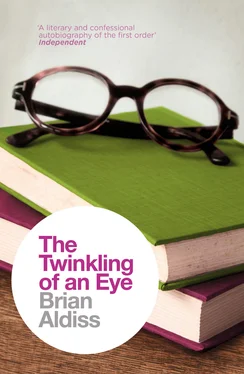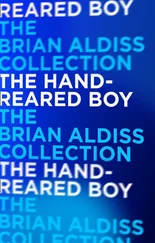Bill does everything his father asks of him, is submissive, dutiful. Whereas Gordon has been known to cheek The Guv’ner and please himself.
On a wall in our long corridor, next to the photograph of Bill in a pierrot outfit, hangs a photo of Gordon and Bill as boys. They sit companionably on a rug together, with two terriers standing by. They wear caps and have guns tucked under their arms. Once they were friends. The photograph must cause Bill pangs of regret.
The traitorous thing is this, that I quite like Gordon and Dorothy. I occasionally go round to the Corner House where they live, where Dot never sets foot. They appear much richer than we are. Their house is better furnished. It is a puzzle. Also Dorothy has a huge folding tray table with raised edges, made especially for jigsaws; we work together amicably on a huge landscape which includes huntsmen. I labour under the impression that Dorothy is nice to me. I like my cousin Derek. And Gordon is generally genial if overbearing.
Tony and I kick a football about in their garden. He sends it through a window and bursts into tears. So I am one up on him. I would not cry.
Dorothy tells me a joke I am supposed to riddle out: ‘The Queen reigns over China’. I know she does not reign over China, but eventually we tease out the word-play. She rains every night, into her china chamber pot.
We are all convulsed with laughter. Fancy thinking that of haughty Queen Mary! The mere idea of Queen Mary peeing sends us into fits.
I go home and tell the joke to Dot. She is far from laughter. It is disgusting and vulgar, not a joke at all. Like an earlier queen, Dot is not amused.
My picture of Dereham, which we leave finally when I am twelve years old, is coloured by the attitudes of my parents. Only later do I realise Bill’s dependence on his father: he was my hero, and I thought he depended on no one. I perceive his dislike of Gordon, his brother, I soon realise how Dot suffers from paranoia.
She loves to accuse everyone of backbiting , while indulging in it herself. She is sweet to everyone’s face, cruel when they have gone. She is nervous. She consults Dr Duygan, whose advice to drink a whisky-and-soda after lunch every day has not entirely resolved her unhappiness. She suffers from being overweight, so that we visit Yarmouth to buy Dr Scholl’s shoes. Her largely unarticulated view of Dereham is that it is a kind of prison. Narrow-minded, she calls it.
She takes books from both Webster’s, the bookseller, and from Starling’s Lending Library. Starling’s books come in a protective cardboard jacket on which is printed a legend: ‘A Home without Books is like a House without Windows’. Dot often reads the legend aloud to me. ‘How true!’ she exclaims. Or perhaps more mysteriously she will say, ‘Too true, O King!’, quoting I know not what.
Gorleston on Sea figures large in our lives. From Dereham to Gorleston is about thirty-five miles. Gorleston is beautiful, a small, elegant seaside resort, with a bandstand and a pierrot show in summer. While I like everyone in the pierrot show, my favourite is the comedian (‘I’m the one who makes you go ha-ha,’ he sings as he comes on). Later we shall live in Gorleston for a while, as reported, until war breaks out, and the world we know falls into little bits, and the jolly rude picture postcards blow away down yesterday’s beaches.
Before the Five Year Abyss opens at my feet, Dot escorts me every September to the Dereham fair. On one occasion, I escape from Dot and rush to see a sideshow where a man stands bare-chested, swallowing watches offered by his audience. He gets hold of a turnip watch on a gold chain. He tips back his head and gulps it in, lowering it into his insides link by link, as if sinking an anchor into the North Sea.
He beckons me out of the crowd. Horrified, I go forward. I am forced to place my ear against his chest to give a sounding. I hear the watch ticking, entangled somewhere among the sea wrack of his lungs.
The watch is hauled up again, glittering with phlegm.
Another time, Dot plays the Wheel of Fortune, to win a yellow Norwich canary in a cage. She bears it home in triumph.
The bird becomes a favourite and ‘sings its heart out’. Considering how it is imprisoned and can never fly again, the phrase seems appropriate. It (or she, rather) lays many eggs, which Bill blows, to keep the shells bedded on cotton wool in a tobacco tin. Both Bill and Dot are baffled by this sequence of eggs.
One day, Bill gets up to riddle yesterday’s cinders and lay a fire in the grate, when he discovers the canary supine at the bottom of the cage, claws in the air. Alarmed, he takes it out and administers brandy to it on the tip of one of its feathers. The bird makes a full recovery, and continues to chirrup its song for many a year.
Bill, incidentally, is an expert on birds and birdsong. I stand with him, mute, on the edge of a great field. He waits under a tree, gun at the ready, for something for the pot, a rabbit or a pheasant. He wears plus fours and a cap at a rakish angle. I wear a tammy and rubber boots. A strange creaking note is heard distantly.
‘That’s a corncrake,’ he tells me. It seems a curious name for a bird. Nowadays, I fancy, modern methods of farming mean that the song of the corncrake is no longer heard over Norfolk farmland.
The fair comes to East Dereham with the ripe apples of harvest time.
While we in the Congregational church are lustily singing that ‘All be safely gathered in, Ere the winter storms begin’, the fair people are gathering in on the outskirts of town, waiting to invade. Tony and I mingle with the gypsies, their dogs and horses – and probably Alfred Munnings RA. The large caravans, the big rides, the big roundabouts are pulled by traction engines. The engines whistle and scream as the lofty monarchs are stoked into life.
Here the film is unreliable. Clever editing suggests that every year I run in to town beside the turning wheels of one of these machines, along with other urchins. I do so at least once. The hint of perpetuity remains, so great is the delight.
The ground shakes as our traction engine rolls towards the market place. A savage man with a red kerchief round his throat shovels in coal, standing high above us, a god with a black face. The great painted wheels turn, the twisted brass barley-sugar sticks that support the roof gleam, the furnace looks like the entrance to hell, while the smoke tastes like a whiff of paradise. We run yelling beside it, drinking in its power, all the way to the market square.
At the far end of the square, the Dodgems rink goes up rapidly. Once, with my friend Buckie, I discover a half-crown in a car recently vacated. We rejoice in our luck.
A visual treat is erected at the H. H. Aldiss end of the market place. The big roundabout is built round the traction engine that powers it. Under the striped canvas roof, a parade of monstrous bright animals, cockerels, tigers, spirited white horses and dragons, dances round and round, up and down, barely restrained from breaking out into the crowd and freedom.
How the staff of H. H love the fair! During their lunch hour, their one brief taste of liberty during the day, the young ladies of the drapery department, like a flock of blackbirds in their dark dresses, fly towards the attractions, sweeping me up with them as they go.
There’s my flirtatious millinery lady, all tease and flame! She shows her legs as we climb aboard the roundabout. Already the music starts, the platform begins to glide! I am lifted high by her, by her giggling friends, up, up on to the most Chinese of dragons. It seats three people. It begins to move. Up, down, up, down. The young ladies clutch me. I smell their perfumes. We all shriek. The music plays. The day shines and blurs.
Читать дальше












